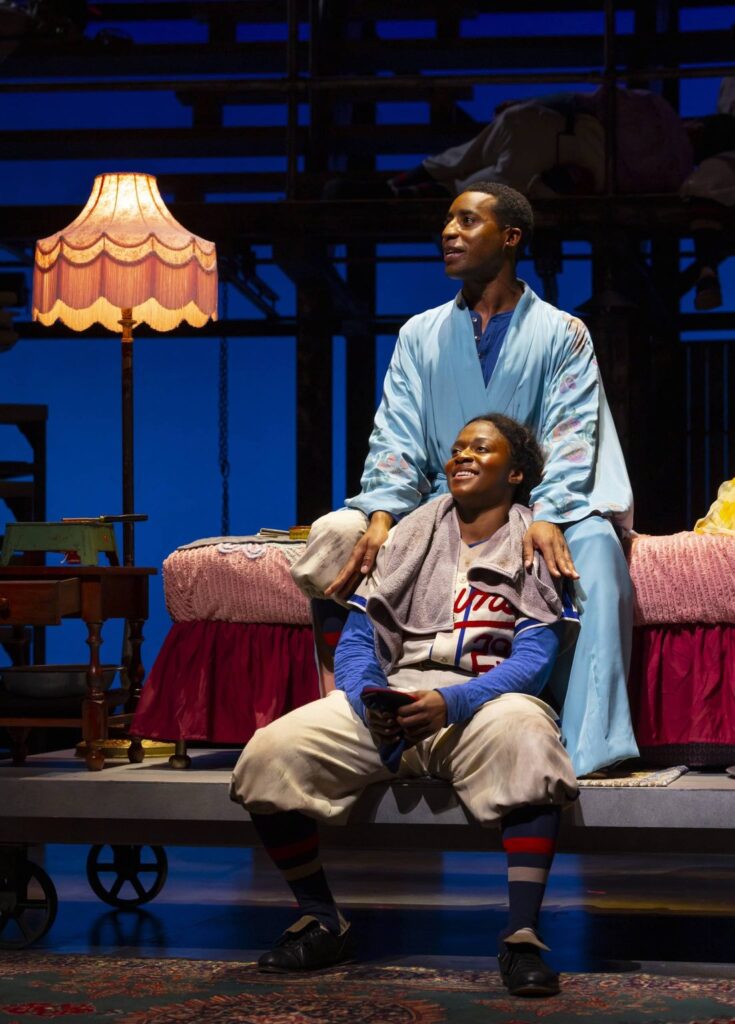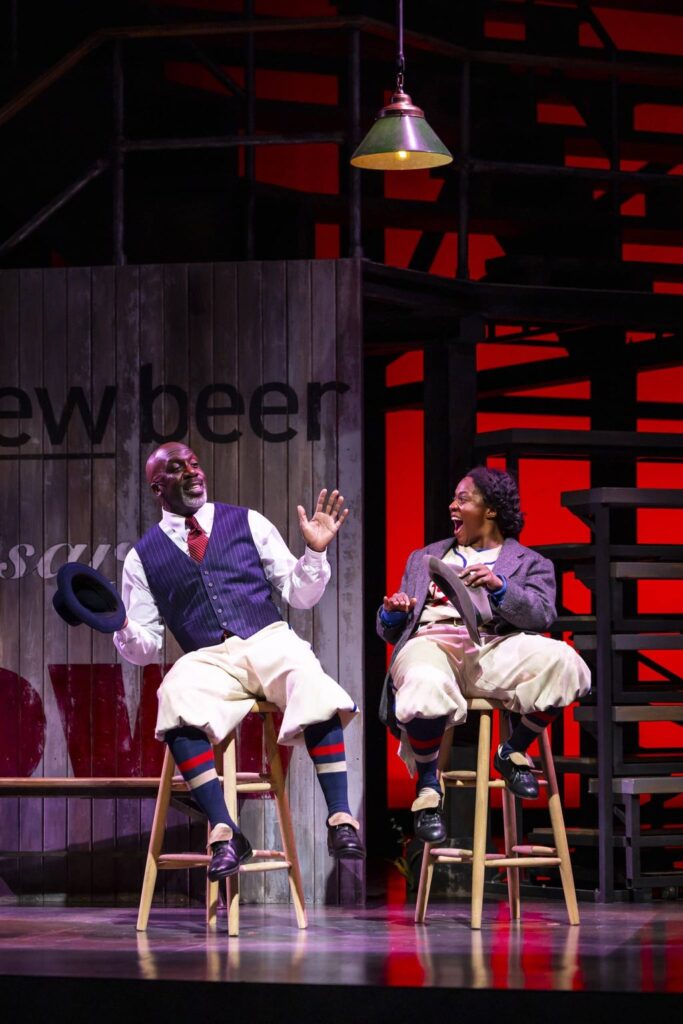
By Shelley A. Sackett
Toni Stone, the subject and title of playwright Lydia R. Diamond’s new drama, has one helluva story to tell. As played by the pitch-perfect Jennifer Mogbock, she is also one helluva terrific storyteller and more than up to the task of narrating the events of her remarkable life.
Which is a good thing, because “Toni Stone,” now at the Huntington, ran almost three hours (with a long intermission and delayed start) on opening night last Wednesday.
Even before the house lights have dimmed, Collette Pollard’s exciting set has placed us smack in the middle of a baseball field, surrounded by bleachers, scoreboards and night lights. Mogbock, a spitfire of energy and physicality, practically leaps onto the stage. A ball rolls slowly on the ground towards her, and she bends down to pick it up.
“The weight of the ball in the hand and the reach,” she announces matter-of-factly as she tosses it in the air. “What this is is what boys are to that girl. This is what I need.”
This — baseball in all its statistical, scientific, and athletic glory — is also what she knows, “maybe better than that girl knows boys.”
Disarming, genuine, and boundlessly enthusiastic, Stone shares her life’s highlights, from her birth in West Virginia to growing up in St. Paul, Minnesota, to becoming the first woman to play baseball in the Negro Leagues. Every step of the way, her single-minded determination to achieve her dream of playing professional baseball lit her path. Overcoming daunting racial and gender barriers, she landed the second base roster spot with the Indianapolis Clowns, taking Hank Aaron’s place when he moved up to the majors in 1953.

Stone’s job, she tells the audience, is to tell her story so history doesn’t forget. The audience’s job, she implies, is to remember it. And to pass it on.
With that, the rest of the team bursts onto the stage. Stone introduces them one by one, and then they perform the first of several fabulous dance/acrobatic acts (choreographed by Ebony Williams with original music from Lucas Clopton). These top-notch numbers are a welcome break from the sometimes long stretches of dialogue and give the cast a chance to break loose and shine.
Mogbock is the only woman in the 11-member ensemble, and the ten actors take on individual characters as well as Clown teammates. As Millie, a prostitute who befriends Stone and tries to instill some femininity into the baseball-statistic-obsessed tomboy, Stanley Andrew Jackson is a sublime showstopper. Others play Stone’s parents, manager, coach, and husband. With a simple announcement (“He’s white”) and hand gestures, the all-Black cast also takes on white racist characters in subtle but dramatically powerful ways.

Through sometimes chronologically disjointed scenes, Stone connects the dots of her personal timeline and, along the way, emotionally connects with the audience. By the end of the play, we don’t just know Stone; we adore her.
She is a complex character, as insecure and flighty socially and intellectually as she is confident and down to earth about her knowledge of and ability to excel at baseball.
As an athletically gifted kid in St. Paul, she excelled at every sport she tried. When her mother steers her towards more “ladylike” sports like figure skating (cute skirts), she easily wins the top city-wide competition and then begs to go back to the sport she really loves. She hated school both because she was bored and because the teachers pigeon-holed her as mentally impaired, misunderstanding her inability to process social cues and making her feel even more isolated and alone. (“When someone tells you there’s something wrong with your mind, you believe them,” she explains).
Yet, there’s nothing wrong with her mind when she’s thinking about a topic that interests her. As she argues with coaches about strategy, spouts baseball card statistics like an AI app, and describes baseball in terms that are poetic and metaphysical, she more than holds her own as confident, shrewd, and articulate.
While Diamond keeps the story light and focused on Stone’s journey, she by no means avoids the harsh realities of racism and misogyny in the 1950s. Stone was shunned and harassed by many of her teammates and was deliberately trampled when defending second base by opposing team members who wanted to “take out that woman.”
At the same time, she and her teammates share more than the same uniform. They are keenly aware that white team owners are using them both to make money and to make the white teams look superior by having them lose in rigged games. After all, and lest they forget their place, the team’s name, “Clowns,” is branded on their uniforms.
Like the Reconstructionist era blackface minstrel “entertainment,” they are supposed to, above all else, entertain. “They know we know what they’re doing to us,” Stone says just as Act I ends. “But we still make them laugh.”
Because that’s the only way a Black person or woman could play baseball in a white male world: by playing “their” game by “their” rules. And at the end of the day, the player’s desire to play ball is greater than their pride.

The second act (thankfully shorter and tighter) covers a lot of ground. Stone marries and retires from baseball when she ends up spending more time sitting on the bench than playing. She spends a year being a good housewife and then becomes a nurse. Although Diamond drops the ball on dramatic pacing and content at the end, Stone’s words (and Mogbock’s flawless performance) leave the audience with a semblance of closure.
“There it is,” she says, summing up her life’s story. “I did a thing. Between the weight of a thing and the reach, there is breath. And in that breath is life.” She pauses, looking straight at the audience and melting the proverbial fourth wall. “I reached.”
‘Toni Stone’ — Written and Directed by Lydia R. Diamond. Inspired by “Curveball: The Remarkable True Story of Tony Stone” by Martha Ackmann. Presented by the Huntington, in an arrangement with Concord Theatricals on behalf of Samuel French. At the Huntington Theatre, 264 Huntington Ave., Boston, through June 16.
For more information and to buy tickets, visit https://www.huntingtontheatre.org/